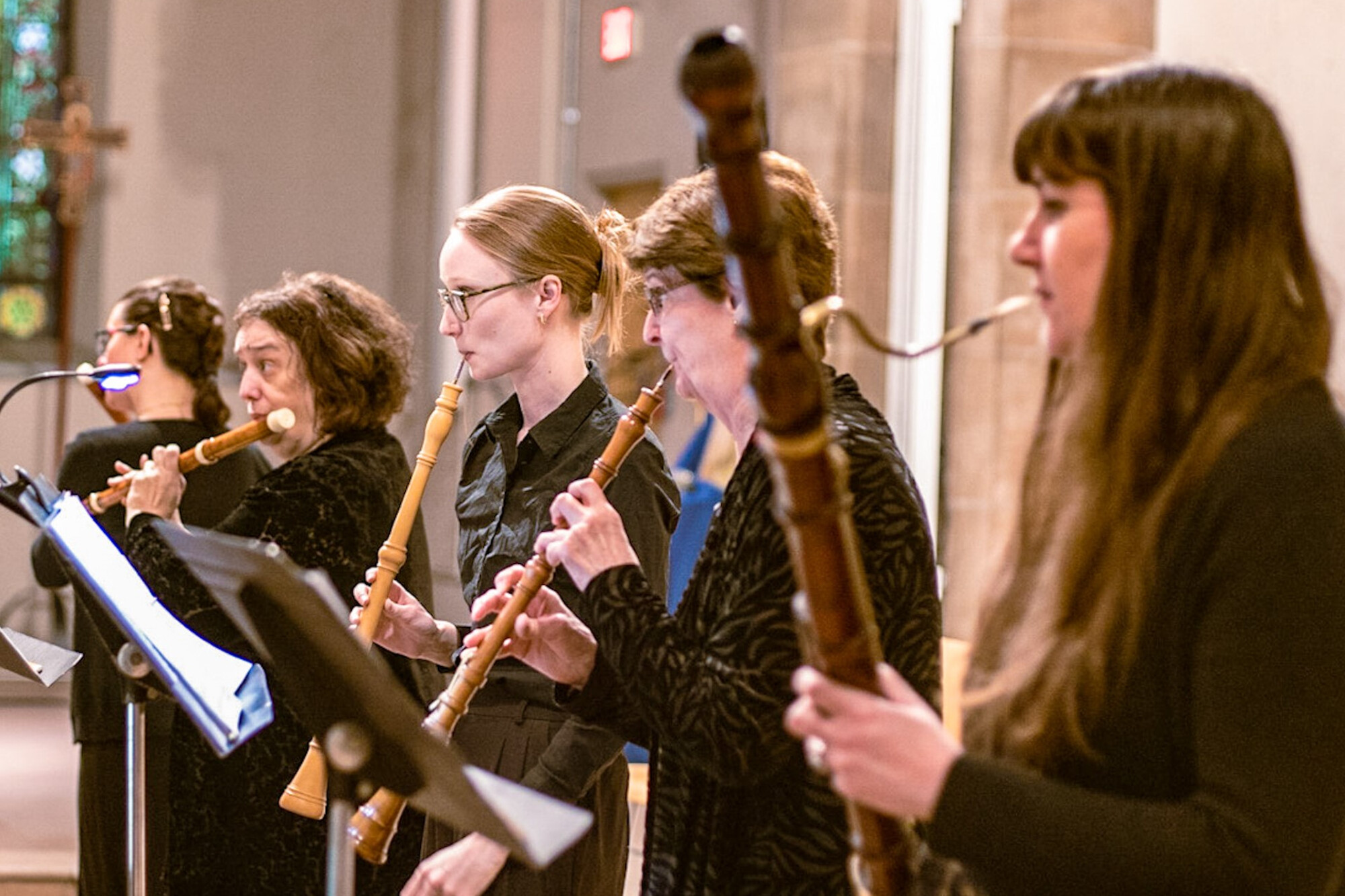
(From left) Doctoral student Hannah Yamagata, research assistant professor Kushol Gupta, and postdoctoral fellow Marshall Padilla holding 3D-printed models of nanoparticles.
(Image: Bella Ciervo)

For three decades, Gwyn Roberts has directed the Early Music Ensembles at Penn, working with about 25 students a semester, focusing on music from the 17th and 18th centuries. In line with her interest in early music, Roberts has spent two years researching the women and girls of Venice’s Ospedale della Pietà, which took in abandoned and orphaned children.
By the 18th century, Roberts says, the Pietà had developed a renowned music school and created a full all-female orchestra and chorus, ensembles of singers, soloists, and instrumentalists. Antonio Vivaldi was the composer in residence. “One of the things I really enjoy doing is programming music that has really interesting stories behind it. And that’s definitely what we’re talking about here,” she says.
With her husband, Richard Stone, Roberts is also the co-founder and co-director of the Tempesta di Mare Philadelphia Baroque Orchestra, now in its 22nd season. A performer on recorder and baroque flute, Roberts is also on faculty at the Peabody Institute of music at Johns Hopkins University.
Vivaldi’s “Juditha Triumphans” will be performed at 4 p.m. on Saturday, March 16, in Irvine Auditorium by Tempesta di Mare with the Penn Collegium Musicum student chamber choir, which is directed by Meg Bragle, artist-in-residence. Composed in 1716, the oratorio was premiered by the women who lived at the Pietà who were cast in all roles, including those of male characters and the four-part choruses. The two-hour performance is in Latin with a projected English translation.
An oratorio in the baroque is like an opera in style, with a sacred subject, Roberts says. “Juditha Triumphans” is based on the Old Testament story about the young widow Judith, who beheads the Assyrian general Holofernes. It’s a “spectacular” piece of music but is seldom performed, Roberts says. It requires nearly 30 instruments, many more and more varied than what is typical in a baroque orchestra. “It’s really unusual that we are doing it at Penn,” she says. Bragle will be the soloist in the leading role of Judith, along with Kirsten Sollek as Holofernes, Rebecca Myers as Vagaus, and Gabriela Estephanie Solís as Abra.
First performed in the music room of the Pietà, the women and girls, ranging in age from teens to 80-plus, were behind metal screens, as it was considered indecent for females to sing and play instruments in public. The screens also served to protect them in some ways, Roberts says, as many who lived at the Pietà had physical disabilities and differences. Most of the musicians lived and were educated and cared for at the Pietà their entire lives, Roberts says. Women ran the music program, managing the rehearsals and performances with senior musicians training the junior musicians. Most of these women would have otherwise led lives among the most despised and outcast in Venetian society, she says.
“They can read and write, which is unusual. They have an integrated society for themselves, and they are making fantastic music all the time. And they are well known for it. People came from all over Europe to hear their performances,” Roberts says. “I find that to be a really inspiring and empowering story.”
Roberts learned to play a Bach minuet when she was 6 and was drawn to baroque music. “I’ve always loved it. But it’s always been the music of men. And so, for me, seeing these women—not just a token one or two but a whole choir and orchestra with ensembles and soloists—as a tourist attraction, as people who made money for their institutions, it’s incredibly powerful,” Roberts says. “I see myself in this music for the first time.”
The Pietà building, now the Hotel Metrolpole Venezia, is where Roberts stayed while conducting her research: “It was literally the building where the musicians had lived, which kind of gave me chills.” It is directly across from a grand white church named for Vivaldi, built 20 years after his death. “And yet there’s not even a single marker about the women for whom he wrote the music and who performed it,” she says.
Roberts hopes to shift the focus and bring attention to the women of the Pietà through the music they performed. The program for the March 16 performance lists the names, ages, and instruments and voice parts of the musicians who premiered “Juditha Triumphans” in the Pietà music room 300-plus years ago.
“It’s the men who had the access and who had the opportunity to write music for public performance and for larger ensembles,” Roberts says. “But there are women, people of color, there are all sorts of non-aristocratic, non-male people to be found in the music if you just look for them.”
Concert tickets are available online. Student admission is free with a Penn Card.
Louisa Shepard

(From left) Doctoral student Hannah Yamagata, research assistant professor Kushol Gupta, and postdoctoral fellow Marshall Padilla holding 3D-printed models of nanoparticles.
(Image: Bella Ciervo)

Jin Liu, Penn’s newest economics faculty member, specializes in international trade.
nocred

nocred

nocred